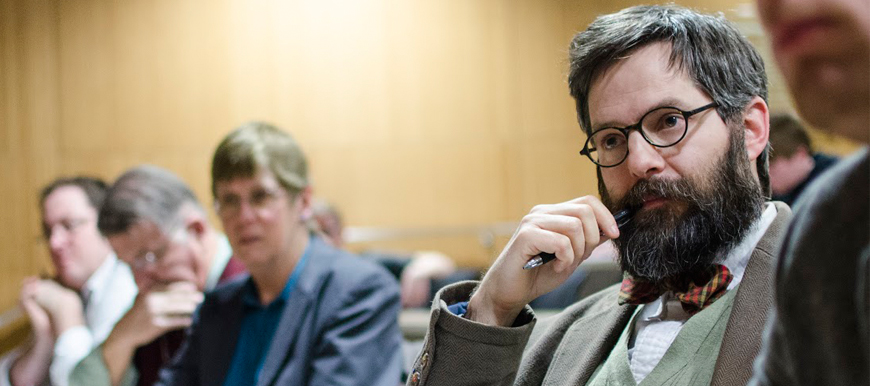Preaching vs teaching
Professors, students and community members gathered Tuesday for a “Big Questions” panel dealing with the discussion of religion in the classroom.
The panel was hosted by the Religious Studies department, with four professors sitting in to answer questions on the theme of the difference between religion and theology.
All four professors, Christopher Blythe, Bonne Glass-Coffin, Harrison Kleiner and Richard Sherlock, had 10 minutes each to share their personal backgrounds, their paths to becoming educators and their views on sharing religion and personal beliefs in the classroom.
Each professor shared various views on religion in the classroom, including whether or not it’s appropriate to share personal beliefs in the classroom setting versus being entirely detached in teaching religious studies. The last portion was for the audience to ask the panel members more about their views.
“In religious studies we study about religion, not seek for converts,” Blythe said.
Sherlock, who frequently visits all of the professors in the department to discuss this topic, was the one who wanted to put together the panel.
“[It was] his brain child. Since we have all these different views, he said we should put them out there,” Blythe said.
It’s all about discussion and dialogue, not debate, Glass-Coffin said. An educator should put themselves personally into the classroom, but there is a line, and proselytizing is not appropriate, she said.
“I tell my students, ‘If you paid for my opinions, you over-paid,'” Kleiner said. “I want you to learn from Plato. … I want you to learn from people who are actually worth listening to, and I am not one of those people. … I really believe the big questions are taught in my classes. I don’t think because I suspend my own personal convictions that my classes aren’t about big questions. They are.”
Students from many different fields of study attended because of involvement in religious studies at the university or for extra credit in a class.
“I’m used to talking about religion in a classroom setting, not anyone speaking from religion,” Erika Lamborn said. “I’m interested to see what professors say from that point of view.”
Lamborn, a junior in philosophy and environmental studies, was also interested in seeing what might be said about Christianity and all other religions, due to the religious majority at USU.
“It is interesting, seeing if there are any conflicting interests, or to see if people feel like they have their religions pushed against — hopefully not, but you never know,” Lamborn said.
Tracy Welker, a junior in philosophy and psychology, came for a class and to hear the opinions of many of her professors, including real arguments on the topic instead of just sharing emotions.
“I think that a person’s belief and experience with faith is important to them,” Welker said. “And from the psychological perspective, this is also important. Whether or not you are able to express your beliefs, and if not, how you’ll be influenced by public opinion.”
To learn more about the Religious Studies Club and events sponsored by the club visit history.usu.edu/htm/study/clubs-and-organizations/religious-studies-club.
— mandy.m.morgan@aggiemail.usu.edu

